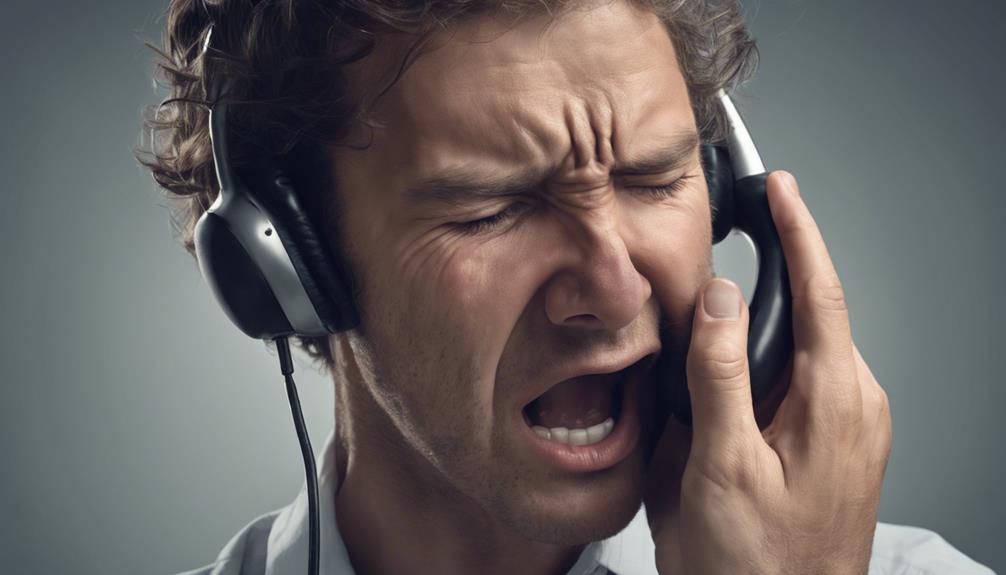Are you concerned about possible hearing loss? It’s important to know how to recognize the signs and symptoms early on in order to address the issue promptly and effectively.
From struggling to follow conversations to needing higher volumes on devices, subtle indicators may signal a decline in your hearing health. Understanding these warning signs can help you take the necessary steps towards preserving your auditory abilities.
Key Takeaways
- Difficulty hearing in noisy environments and conversations, especially in groups.
- Needing frequent volume adjustments on devices for better clarity.
- Avoiding social gatherings due to challenges in hearing and understanding.
- Asking for repetitions or experiencing misunderstandings in communication.
Early Indicators of Hearing Loss
Recognizing the early indicators of hearing loss is crucial for maintaining optimal auditory health and quality of life. Difficulty picking up high-pitched sounds, such as birds chirping, or feeling like conversations in noisy environments are slipping away could signal the onset of hearing loss.
Sensitivity to loud noises and the need to constantly adjust the TV or music volume may also point towards potential issues with hearing. Finding yourself exhausted after social interactions due to the strain of trying to hear clearly is another red flag.
Some individuals might start relying more on lip reading or experience a sensation of clogged ears despite no physical blockages present. These early signs shouldn't be ignored, as they can provide valuable insights into the state of one's auditory health.
If you resonate with any of these indicators, seeking professional evaluation and assistance can help address potential hearing loss proactively.
Common Signs of Declining Hearing

Experiencing difficulty understanding speech, especially in noisy environments, is a common indicator of declining hearing. If you find yourself constantly needing to increase the volume on devices like the TV or phone to hear clearly, it could be a sign of potential hearing loss. Struggling to follow conversations, particularly in settings with multiple speakers, may also point to deteriorating hearing.
Sensitivity to loud noises or discomfort in noisy environments can be another red flag for a decline in hearing ability. Feeling isolated or avoiding social situations due to challenges in hearing and understanding others is a common response that should prompt a hearing evaluation. Recognizing these signs early on is crucial in addressing any potential hearing issues and seeking appropriate interventions to maintain a good quality of life. If you resonate with any of these signs, it might be time to consider a professional hearing assessment.
Recognizing Hearing Loss Symptoms
In our daily lives, the subtle signs of hearing loss can often go unnoticed until they begin to impact our ability to engage fully in conversations and activities.
Difficulty hearing clearly in conversations, especially in noisy environments, could be a significant sign of potential hearing loss. If you find yourself asking for frequent repetitions or experiencing misunderstandings in speech, it may be time to consider your hearing health.
Additionally, an increased reliance on higher volumes for music or TV audio might signal a decrease in hearing sensitivity. Struggling to hear on the phone or follow dialogue in movies or shows can also be indicators of hearing impairment.
Furthermore, finding it challenging to keep up in group conversations or social settings could be a symptom of hearing loss. Paying attention to these signs and symptoms can help in recognizing potential hearing issues early on, allowing for timely intervention and management.
Warning Signs of Hearing Impairment

Noticing warning signs of hearing impairment is crucial for seeking timely intervention and managing potential issues effectively. When it comes to recognizing early indicators of hearing problems, there are several key warning signs to be aware of:
- Difficulty hearing conversations in noisy environments can be a common early warning sign of hearing impairment.
- Struggling to understand high-pitched sounds such as children's voices or birds chirping may indicate the onset of hearing loss.
- Needing to frequently raise the volume on electronic devices like TVs or phones could signal developing hearing issues.
- Feeling isolated or avoiding social gatherings due to challenges in following conversations can be a red flag for potential hearing problems.
- Asking for frequent repetitions or experiencing misunderstandings in speech can serve as early indicators of hearing impairment that shouldn't be overlooked.
Being mindful of these warning signs can help individuals take proactive steps towards addressing potential hearing issues and seeking appropriate assistance.
Symptoms of Potential Deafness
Recognizing symptoms of potential deafness is essential for early detection and appropriate intervention to address any hearing challenges effectively. When it comes to identifying signs of potential deafness, there are several key indicators to be aware of.
| Symptom | Description |
|---|---|
| Difficulty hearing conversations | Struggling to follow discussions, especially in noisy environments. |
| Trouble discerning high-pitched sounds | Finding it hard to hear sounds like children's voices or alarms. |
| Increased volume adjustments | Needing to turn up the volume on devices like TVs or phones frequently. |
| Avoiding social gatherings | Feeling isolated or skipping events due to difficulties in hearing. |
If you experience persistent symptoms such as ear pain or sudden changes in hearing, seeking a professional evaluation is crucial. Remember, early detection plays a vital role in managing potential deafness effectively. Don't hesitate to consult a healthcare provider if you notice any of these signs to ensure timely intervention and appropriate care.
Frequently Asked Questions
How Do You Check if I Am Going Deaf?
If we're wondering about potential deafness, it's crucial to pay attention to signs such as:
- Difficulty hearing conversations
- Struggling with high-pitched sounds
- Needing louder volumes on devices
Feeling isolated during social interactions due to hearing challenges is another red flag. Seeking professional evaluation for persistent hearing loss signs can provide clarity on our hearing health.
It's essential to stay proactive and address any concerns promptly for optimal well-being.
What Are the Early Warning Signs of Hearing Loss?
We've gathered some key early warning signs of hearing loss that you should be aware of.
Difficulty hearing in noisy environments, asking for repetitions in conversations, increasing volume on TV or music, struggling to hear clearly on the phone, and finding it hard to follow conversations are all potential indicators of developing hearing issues.
It's crucial to pay attention to these signs and seek professional guidance if you notice any of them.
How Does Going Deaf Start?
We experience the onset of deafness with a gradual loss of hearing, especially in high-frequency sounds. This can lead to difficulties in understanding speech, particularly in noisy environments. Over time, our hearing can deteriorate, affecting daily interactions and communication.
Changes in volume settings, mishearing words, and feeling isolated in group discussions are common early signs. Seeking prompt evaluation and treatment can aid in managing and potentially slowing down the progression of deafness.
What Happens Right Before You Go Deaf?
As we approach deafness, our world starts to sound like a muffled radio station. Conversations become puzzles, and the symphony of life fades into whispers.
The journey to deafness can be a gradual one, marked by challenges in understanding speech and sensitivity to loud noises. Recognizing these signs right before going deaf is crucial.
Seeking immediate medical attention is key to preserving your hearing and quality of life.
What Are the Early Signs and Symptoms of Deafness to Look Out For?
If you notice any early signs of deafness in yourself or a loved one, it’s important to seek medical attention right away. Some common symptoms to look out for include difficulty following conversations, frequently asking others to repeat themselves, and turning up the volume on electronic devices.
Conclusion
As we navigate the complexities of hearing loss, let's remember that our ears are windows to the world around us. Just like a delicate flower needing gentle care and attention to bloom, our hearing health requires nurturing and understanding.
Let's listen not only with our ears but with our hearts, embracing the beauty of sound in all its forms. Let's take proactive steps to protect our precious gift of hearing, for it truly is music to our souls.










